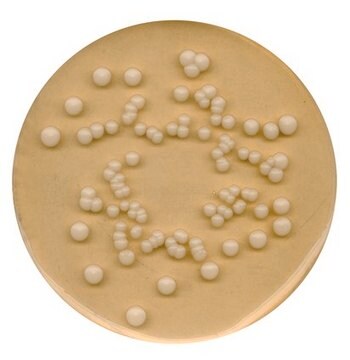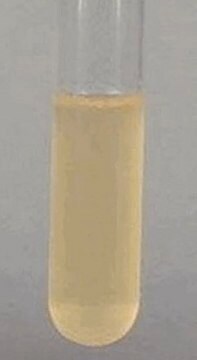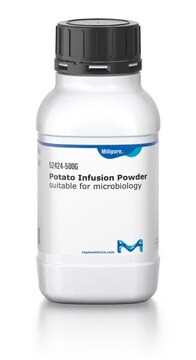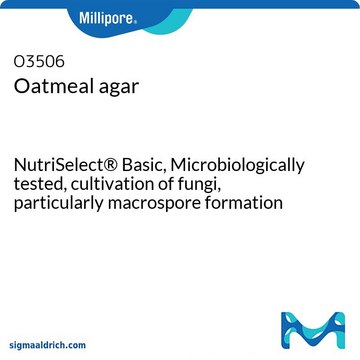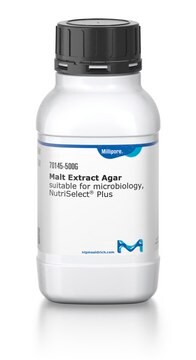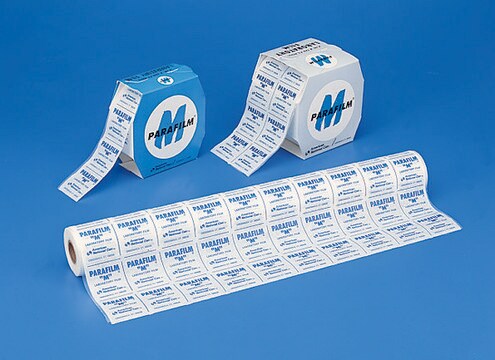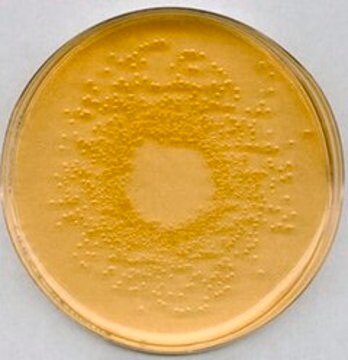P2182
Potato Dextrose Agar
Recommended for the isolation of yeasts and molds, NutriSelect® Basic
Sinónimos:
PDA
Iniciar sesiónpara Ver la Fijación de precios por contrato y de la organización
About This Item
Código UNSPSC:
41171605
NACRES:
NA.85
Productos recomendados
origen biológico
potato
Nivel de calidad
esterilidad
non-sterile
formulario
powder
fabricante / nombre comercial
NutriSelect® Basic
pH
-5.6-25 °C
aplicaciones
bioburden testing
cosmetics
food and beverages
microbiology
pharmaceutical
sterility testing
temp. de almacenamiento
10-30°C
idoneidad
bacteria
molds
yeasts
Categorías relacionadas
Descripción general
Potato Dextrose Agar is used for the cultivation of bacteria, fungi, yeast, and molds. The low pH makes the media selective for acid tolerant bacteria, fungi, mold, and yeasts. It is used for studying ascospore dispersal. Potato extract serves as a source of carbon, nitrogen, minerals, vitamins, and other essential growth nutrients. Dextrose acts as source of carbohydrate.
Aplicación
PDA is recommended for use in: -
- The isolation and enumeration of yeasts and molds from food and dairy products
- Stimulating sporulation
- Maintaining stock cultures of fungi
- Differentiating various dermatophytes based on pigment production
Componentes
Potato extract - 4 g/L
Dextrose - 20 g/L
Agar - 15 g/L
Dextrose - 20 g/L
Agar - 15 g/L
Otras notas
Contains: Infusions from potatoes, glucose and agar.
Nota de preparación
Solve 39 g in 1 litre distilled water. Autoclave 15 minutes at 121°C.
Nota de análisis
Microbiologically tested.
Nota al pie de página
We offer two media types: the superior granulated GranuCult® and the cost-efficient powdered NutriSelect® culture media, depending on your needs.
The designations basic, plus, or prime are added to indicate the quality control level, from basic quality control to standard QC plus to prime for full regulatory compliance.
The designations basic, plus, or prime are added to indicate the quality control level, from basic quality control to standard QC plus to prime for full regulatory compliance.
Información legal
GRANUCULT is a registered trademark of Merck KGaA, Darmstadt, Germany
NutriSelect is a registered trademark of Merck KGaA, Darmstadt, Germany
Código de clase de almacenamiento
11 - Combustible Solids
Clase de riesgo para el agua (WGK)
WGK 3
Punto de inflamabilidad (°F)
Not applicable
Punto de inflamabilidad (°C)
Not applicable
Equipo de protección personal
Eyeshields, Gloves, type N95 (US)
Elija entre una de las versiones más recientes:
¿Ya tiene este producto?
Encuentre la documentación para los productos que ha comprado recientemente en la Biblioteca de documentos.
Los clientes también vieron
Two convenient methods to evaluate soybean for resistance to Sclerotinia sclerotiorum
Chen Y and Wang D
Plant Disease, 89(12), 1268-1272 (2005)
Sclerotinia Diseases of Crop Plants: Biology, Ecology and Disease Management, 403-403 (2008)
Effect of chestnut tannin extract (Castanea sativa Miller) on the proliferation of Cladosporium cladosporioides on sheep cheese rind during the ripening
Messini A, et al.
International dairy journal, 66, 6-12 (2017)
Julia Schumacher et al.
Eukaryotic cell, 7(4), 584-601 (2008-02-12)
Recently, we showed that the alpha subunit BCG1 of a heterotrimeric G protein is an upstream activator of the Ca(2+)/calmodulin-dependent phosphatase calcineurin in the gray mold fungus Botrytis cinerea. To identify the transcription factor acting downstream of BCG1 and calcineurin
Nuestro equipo de científicos tiene experiencia en todas las áreas de investigación: Ciencias de la vida, Ciencia de los materiales, Síntesis química, Cromatografía, Analítica y muchas otras.
Póngase en contacto con el Servicio técnico